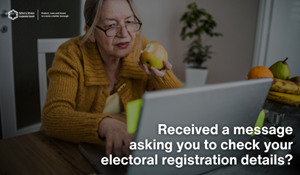Residents in Telford and Wrekin urged to take action and check voter details
Telford & Wrekin Council has started to contact households across the Borough asking residents to check their electoral registration details, so they don’t lose their right to vote.
The Council is required by law to write to the borough’s 87,000 households to confirm whether the information on the electoral register is accurate and complete.
It is important that voter details are up to date and that everyone who is eligible to vote can do so, so they can have a say on who represents them to make decisions locally and nationally. Recent home movers in particular are urged to check.
You may have received an email from Electoral Services - Telford & Wrekin Council. If you are concerned about whether or not the email is genuine, the email subject will include Act now so Telford and Wrekin Council can check who is eligible to be registered to vote at your address and will display the council’s logo. It will also give instructions on how to update details for all members of the household.
From Wednesday 16 July, letters were posted to all other households. If things have changed, such as another person coming to live at, or someone leaving the property, the letter will explain how to update the details.
People should read the letter carefully as they may be required to respond.
David Sidaway, Electoral Registration Officer at Telford & Wrekin Council, said:
“It’s really important that everyone who is eligible to vote is registered to do so. We don’t want residents to miss out on having a voice in elections and being able to influence decisions that matter to them.
“Please look out for communication from Telford & Wrekin Council asking you to check your registration details, so we can make sure the electoral register is accurate and up to date.
“We may contact you by email or post. The easiest way is to respond online which takes just a few minutes or you can phone.
“If you’re not currently registered, your name will not appear in the communications we send. This means you won’t be eligible to vote and not being on the electoral register can also affect other things too, like your ability to open a bank account or order a mobile phone as it helps credit agencies to verify your identity. If you want to register, just go online at www.gov.uk/register-to-vote.”
Information on registering to vote is available on the Electoral Commission website.
Residents with questions about their registration status can contact the Council’s electoral services team by emailing registration@telford.gov.uk or calling 01952 383206.
Ends
Notes to editors
1. The Representation of the People Act 1983 places a duty on electoral registration officers to maintain the electoral register for their area and to conduct an annual canvass of all residential properties.
2. The electoral register lists the names and addresses of everyone who is registered to vote. The register is used for electoral purposes, such as making sure only eligible people can vote. It is also used for other reasons as specified in law, such as detecting crime (e.g. fraud), calling people for jury service or checking credit applications.
3. The open register is an extract of the electoral register, but is not used for elections. It can be bought by any person, company or organisation. For example, it is used by businesses and charities to confirm name and address details. Your name and address will be included in the open register unless you ask for them to be removed. Removing your details from the open register does not affect your right to vote.
4. To be eligible to register to vote a person must be:
• aged 16 or over (a person may register to vote at 16, but may not vote until they are 18)
• a British or qualifying Commonwealth citizen who has leave to enter and remain in the UK or does not require such leave
• a citizen of the Republic of Ireland or other European Union (EU) member state
5. British citizens, Irish citizens and qualifying Commonwealth citizens can vote in local elections in England and Northern Ireland, Mayor of London and London Assembly elections, and Police and Crime Commissioner elections.
6. EU nationals legally resident in the UK may currently register to vote in local government elections, providing they meet with the age and residency requirements and that they are not legally incapable of voting. The Elections Act 2022 changed the eligibility of some EU citizens to vote.
7. The changes in voting rights for EU nationals will not affect voters from Cyprus, Malta and Ireland.
8. Full details of the Electoral Commission’s research on the electoral registers can be found on its website.

